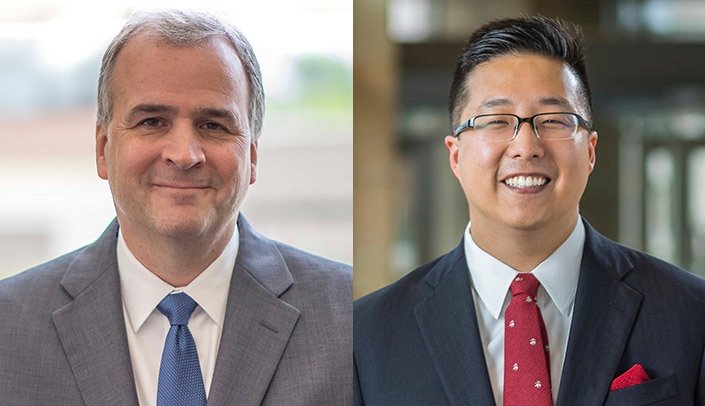One year ago, the UNMC College of Medicine teamed with Region 6 and other area providers to create a psychiatric emergency services system designed to address the statewide gap in behavioral health care.
The result? Psychiatric Emergency Services (PES), a collaboration between the UNMC Departments of Psychiatry and Emergency Medicine that has helped emergency department (ED) physicians and psychiatrists provide timely treatment to 1,775 individuals over the course of the year and developed into a system of warm handoffs and treatment that encompasses more than 30 community partners.
"Of course, behavioral health in Omaha and the state at large is not a single system issue," said Howard Liu, MD, chair of the UNMC Department of Psychiatry. "This was the epitome of a team effort, with philanthropic funding, support from Region 6 and collaboration from other community hospitals, law enforcement, first responders and others."
The emergency department can be a common destination for patients with a behavioral health crisis, said Michael Wadman, MD, chair of the UNMC Department of Emergency Medicine. The use of ED beds for psychiatric patients, especially during the COVID-19 pandemic, had helped lead to increasingly long boarding time, which impacts patient safety.
"We were boarding patients for hours, sometimes for days, while waiting for beds in the community," Dr. Wadman said. "This was taking up a big chunk of the department — sometimes as many as eight beds.
"Also, from a patient-care perspective, you’re taking people in acute psychiatric crisis and putting them in the most active, high volume area in the hospital, where we don’t even turn the lights off at night," he said.
The PES effort eased crowding in the emergency department. The unit, located a short distance from the emergency department at Nebraska Medical Center, features an open area, not unlike a living room, with recliners, a television and books. It also features an area with patient rooms.
When patients arrive, there is a psychiatrist, therapist and psychiatric nurse on the unit at all times. The unit also has peer professionals, who can use their lived experience with serious mental illness to empathize with patients.
"It’s a warm, welcoming, healing environment," said Jennifer Sparrock, manager of the unit. "Not taking away from ED, but that’s not what the ED is designed to do – it’s a trauma center. The PES doesn’t look like an institution."
The unit’s patient rooms are available for those who are in crisis – perhaps actively trying to hurt themselves, Sparrock said.
"So we really have two different tracks for the patients as they come through," she said. "Just being able to provide the right type of treatment for the patient in a time of crisis is a big success. Someone who can get over the crisis in the PES with supportive interventions doesn’t need an inpatient bed and can be connected with outpatient services. And when a person does need inpatient services, we’ve fostered the ability to get them transferred to community partners who can provide the inpatient support they need."
"We have built a close partnership with Douglas County, Methodist, CHI and other health systems," Dr. Liu said. "That way, we can do a warm handoff to coordinate care — almost a direct admission."
The result, Dr. Liu said, is a good example of two departments equally committed to helping navigate a unique challenge.
"The PES has made a huge difference, and it’s changing the culture," Dr. Liu said. "This effort has been a huge success in terms of being patient oriented and recovery oriented, of thinking of the patient holistically. Patients get access to immediate behavioral health and addiction services in a healing space."
"From our perspective, it’s worked well," Dr. Wadman agreed. "These patients, instead of being in emergency department beds, are going down to the PES to wait for placement – and in the meantime, they are in a calm and controlled environment with mental health professionals on hand. From a patient’s perspective, it’s a much better experience."

This has been encouraging seeing this unit evolve. Love reading stories and watching videos of the PES growing and providing much needed care.